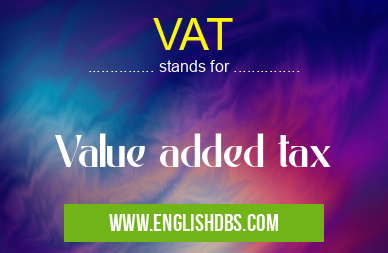What does VAT mean in TAX
Value Added Tax (VAT) is a consumption tax levied on the value added to goods and services at each stage of production and distribution. It is an indirect tax that is ultimately borne by the final consumer.

VAT meaning in Tax in Business
VAT mostly used in an acronym Tax in Category Business that means Value added tax
Shorthand: VAT,
Full Form: Value added tax
For more information of "Value added tax", see the section below.
- VAT (Value Added Tax) is a consumption tax levied on the value added to goods and services at each stage of production and distribution. It is an indirect tax because it is ultimately borne by the final consumer of the goods or services.
VAT Meaning in Business
- In business, VAT is charged on the difference between the selling price of goods or services and their cost of production or purchase. This means that VAT is only charged on the value that is added to goods or services at each stage of the supply chain.
VAT Full Form
- The full form of VAT is Value Added Tax.
What Does VAT Stand For?
- VAT stands for Value Added Tax.
Essential Questions and Answers on Value added tax in "BUSINESS»TAX"
What is Value Added Tax (VAT)?
How is VAT calculated and applied?
VAT is typically calculated as a percentage of the sale price of the goods or services. Businesses register for VAT and collect it from their customers on sales. They can then deduct the VAT they paid on their purchases from the VAT they collected. The net VAT collected is then paid to the relevant tax authority.
What are the benefits of VAT?
VAT is a relatively efficient tax collection system that can generate substantial revenue for governments. It is also considered a fairer tax than some other consumption taxes, as it is applied to all goods and services at the same rate. Additionally, VAT can encourage business efficiency and reduce tax evasion.
What are the disadvantages of VAT?
VAT can be complex to administer and comply with, particularly for small businesses. It can also lead to increased prices for consumers and may disproportionately affect low-income households. Additionally, VAT can be subject to fraud and evasion.
What is the difference between VAT and sales tax?
VAT is a value-added tax, while sales tax is a tax on the final sale of goods or services. VAT is typically levied at each stage of production and distribution, while sales tax is only levied once at the point of sale. Additionally, VAT is usually collected by businesses and remitted to the tax authority, while sales tax is typically collected directly by the seller.
How is VAT used in different countries?
VAT is used in over 160 countries worldwide. The specific rates and regulations vary depending on the country. Some countries have a single VAT rate, while others have multiple rates for different types of goods and services. Additionally, some countries exempt certain items from VAT, such as food and medicine.
Final Words:
- VAT is an important source of revenue for governments around the world. It is a relatively efficient and equitable tax, as it is borne by the final consumer and not by businesses. However, VAT can also be a burden for businesses, especially small businesses, as it can increase their compliance costs.
VAT also stands for: |
|
| All stands for VAT |
